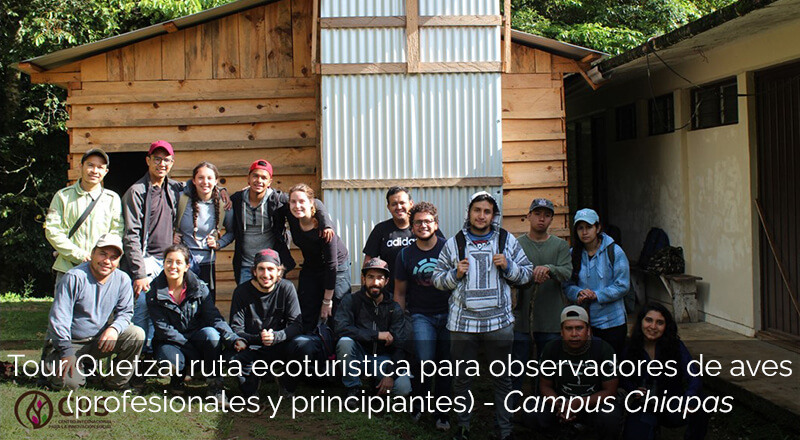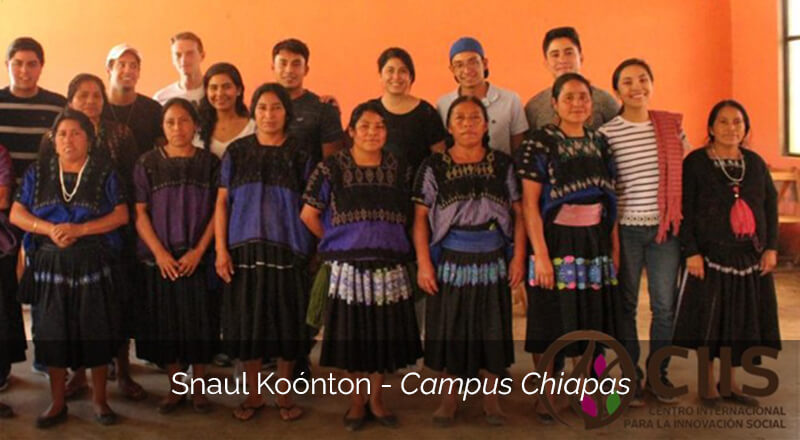Summers i with a Humanistic Outlook - 2019

Context
The Los Lagos de Colores cooperative is the first internal organization in the town of Trinitaria and operates with over 100 families who earn a living from agroecological activities in the communities of this area. Proposals are based on the cooperative’s needs and values, leading to diverse projects that seek the active participation and benefit of every member of the community. The aim of the accompaniment is to share methodologies, tools and applications so the community can capitalize on and make the best and most appropriate use of the available resources.
Challenges
Students were set the following challenges:
- Grow sales in order to drive recognition of the work carried out by the members of the cooperative.
- Learn about and create awareness of costs and expenses, with a focus on solidarity and taking their values into consideration.
- Design and create an instruction manual to use the rainwater collection system.
- Provide support with publicity, use of social networks and a visual material bank.
Outcomes
Los resultados de la intervención fueron:
- Diseño del mercado agroecológico (como nuevo proyecto de la cooperativa).
- Diseño de logos, carteles y publicaciones en facebook que representen sus productos, valores e historia del proyecto soberanía alimentaria.
- Manual para captación de agua pluvial.
- Infográficos para concientizar a la comunidad respecto a problemáticas sociales.
- Estructuración de costos-precios.
- Enriquecimiento multimedia.
- manual de consulta con agrotecnias.
Sustainable Development Goal(s)
The SDGs linked to the challenge are:
- 1. No poverty.
- 2. Zero hunger.
- 3. Good health and well-being.
- 5. Gender equality.
- 12. Responsible production and consumption.
- 15. Life on land.
- 17. Partnerships for the goals.
Education partner organization
The bridge between the actors of the block and society was:
- Los Lagos de Colores Cooperative.
Population
The sector of the population impacted was:
- Members of the cooperative and their families (women homemakers, farmers, young people, children).
Learn more
![]()
A slowU initiative. Further details can be found here.

Context
The state of Chiapas has diverse needs associated with the different sectors that require proposals to solve their main problems. Their design should take into consideration aspects such as environmental protection, finance and social issues. One place in particular is the Nuevo Paraíso Community in the municipality of La Concordia, Chiapas, three hours away from the capital Tuxtla Gutiérrez. The main activities in Nuevo Paraíso are the production and marketing of organic coffee, adventure ecotourism, coffee tasting, the production of coffee plants, and the operation of a small restaurant that serves local food. The Nuevo Paraíso community has developed and improved in several areas, such as: job creation, new market segment, sales, production, training, technical assistance, etc. This makes it interesting to identify needs emerging from the new activities that the community is beginning to perform and from the results obtained, projected to the medium and long terms, which will provide information for studying and considering a possible restructuring of the employment areas, which could be merchandising, exploration, finance, marketing, social networks, human resources, etc.
Challenges
Students were set the following challenges:
- Identify problems with access to the Quetzal route.
- Define the possible route, access and permits for the same.
- Incorporate new players who will participate by providing added value to the Quetzal route, differentiating it from other experiences.
- Reactivate the economy of families who participate in the Quetzal route.
- Implement preliminary studies by Expert Guides.
- Build relationships with cafeterias or restaurants in Tuxtla Gutiérrez.
Outcomes
The outcomes of the intervention were:
- The intervention expanded the ecotourism consumer market and generated a better economy.
- Two new routes: The Coffee Tour and the Birdwatching Tour.
- Good comments on the new experiences given by recent customers.
- New administration and follow-up on customer requests.
- Acquisition of new material to use on the routes/expeditions.
- Contracts and agreements with the cafeteria lines.
- Study to propose a partnership with Tecnológico de Monterrey
Sustainable Development Goal(s)
The SDGs linked to the challenge are:
- 3: Ensure healthy lives and promote well-being for all at all ages.
- 8: Promote sustained, inclusive and sustainable economic growth, full and productive employment, and decent work for all.
- 12: Ensure sustainable consumption and production patterns
Education partner organization
The bridge between the actors of the block and society was:
PUERTA A LA MONTAÑA (PAM).
Population
- The sector of the population impacted was:
- Nuevo Paraíso community, La Concordia municipality, Chiapas.
- Families in Puerta a la Montaña.
Learn more
The following images (PDF file) show some examples of the activities that students carried out in conjunction with the educational partner organization and the inhabitants of the different communities.
![]()
A slowU initiative. Further details can be found click here.

The Snaul Koónton group of women artisans, who belong to the Chenalhó municipality, apart from facing obstacles related to their community, such as the lack of education, extreme poverty and marginalization, among others, have numerous needs as textile traders. One of the most notable needs is the lack of a financial system to set a fair price for their products, which would enable them to increase their presence in the artisan textile market and, consequently, grow the sale of their products. The positive outcome of this would be a better quality of life for the artisans and their families.
Challenges
Students were set the following challenges:
- Implement a fair-trade accounting system.
- Establish the bases for expanding trade for this group of artisans.
- Create a visual catalogue in both Tzotzil and Spanish as a fair-price guide for the products created in the community.
- Choose one representative for each community to improve the organization of training and future visits to trade fairs.
- Design a logo together with the artisans to reinforce brand identity and positioning.
- Design functional, affordable labels that will give customers more information on the product they acquired and the artisan so as to keep track of sales.
- Create graphic tools to enable the artisans to know the value of their garments and keep an inventory of the products sold.
- Produce a promotional video on the artisans’ work and lifestyle for social networks and future events.
Outcomes
The outcomes of the intervention were:
- Standardization of textile garment models.
- Creation of a catalogue of the standardized garments.
- Arrangement of the artisan fair, to be held in the facilities of the International Center for Social Innovation (CIIS) in San Cristóbal de las Casas, and where the artisans will be able to sell their products on a set date within the center’s academic periods.
- Selection of one representative per community.
- Creation of a brand logo based on the embroidery patterns.
- Creation of labels that contain the logo and the history of the garment.
- Creation of an inventory to keep records of the garments.
- Production of a promotional video on the artisans’ work.
Sustainable Development Goal(s)
The SDGs linked to the challenge are:
- 3: Ensure healthy lives and promote well-being for all at all ages.
- 8: Promote sustained, inclusive and sustainable economic growth, full and productive employment, and decent work for all.
- 12: Ensure sustainable consumption and production patterns
Education partner organization
The bridge between the actors of the block and society was:
PUERTA A LA MONTAÑA (PAM).
Population
- The sector of the population impacted was:
- Nuevo Paraíso community, La Concordia municipality, Chiapas.
- Families in Puerta a la Montaña.
Learn more
The following images (PDF file) show some examples of the activities that students carried out in conjunction with the educational partner organization and the inhabitants of the different communities.
![]()
A slowU initiative. Further details can be found click aquí.